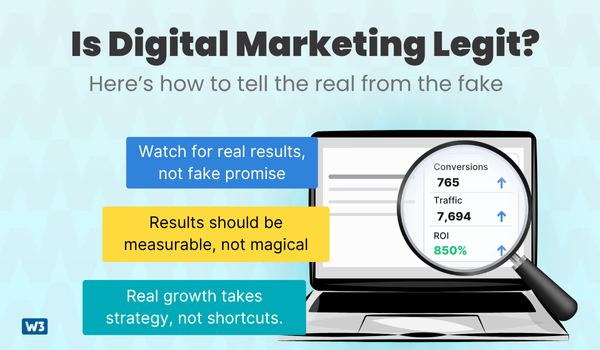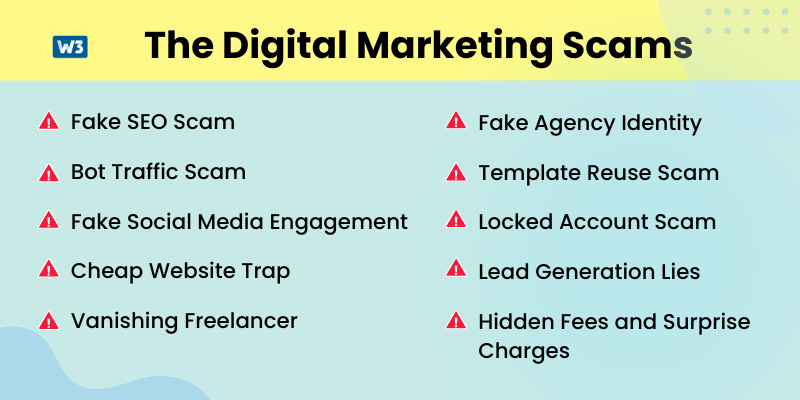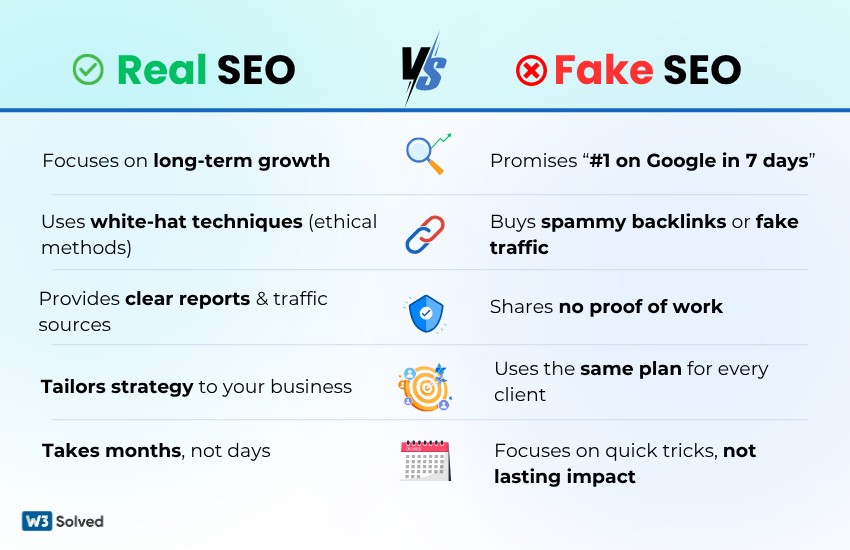Digital marketing can feel overwhelming, especially with all the tools, trends, and shifting platforms. However, one thing stays the same. People still go online to find what they need.
In fact, over 63% of the global population uses the internet, and digital ad spending is expected to surpass $740 billion by 2025. That kind of money brings opportunity but also exploitation.
For every genuine marketing expert, there’s someone selling false promises, fake followers, or shady shortcuts that do more harm than good. If you’ve ever wondered whether digital marketing is legit or just another hype, you’re not alone.
In this article, we’ll break down the top digital marketing scams, how to spot the red flags, and what you can do to protect your business and budget from costly traps.
Is digital marketing legit? or just another hype?
Digital marketing is 100% legitimate but like any fast-growing industry, it attracts hype, misleading shortcuts, and empty promises. Just because someone offers “digital marketing services” doesn’t mean they’re doing it ethically or effectively.
The truth is, digital marketing works when done right. Businesses that use digital marketing are 2.8 times more likely to see revenue growth than those that don’t.
SEO, PPC, email, and content marketing aren’t buzzwords—they’re proven channels that help businesses reach the right audience at the right time.

So where does it go wrong?
Too many shady agencies and freelancers use the popularity of digital marketing to overpromise, underdeliver, or even scam business owners Especially those who aren’t familiar with how digital actually works.
That’s why the real question isn’t “Is digital marketing legit?”—it’s “How do you know who to trust?”
What to look for in a trustworthy agency:
Not every agency has your best interest in mind. Whether you’re hiring for SEO, ads, or full-service marketing, knowing how to separate real expertise from red flags is key.
Here’s what to look for before you sign any contract:
- Real Metrics That Matter: A good agency focuses on measurable outcomes like traffic, leads, and ROI. Be cautious of vague phrases like “brand awareness” without clear data to support them.
- Full Transparency: You should get honest timelines, clear communication, and no exaggerated promises. If it sounds too perfect, question it.
- Tailored Strategy: Effective marketing isn’t copied and pasted. Reputable agencies craft strategies based on your business goals and audience—not generic plans.
- You Stay in Control: A trustworthy agency ensures you retain full ownership of your website, ad accounts, domains, and data. If they control access or hold it hostage, it’s a serious warning sign.
- Proven Experience: Look for case studies, testimonials, and real results. Credibility is built through performance, not empty claims.
The digital marketing scams you need to know
Not every agency or freelancer is what they claim to be. As digital marketing demand skyrockets, so do the number of scams disguised as services. From fake traffic to false leads, shady providers take advantage of business owners who just want results (fast).
These scams don’t just waste your money, they can hurt your brand, damage your SEO, and leave you worse off than where you started. Below are the most common digital marketing scams, what they look like, and how to avoid falling for them.

1. Fake SEO Scam
These are the agencies that promise the world “#1 on Google in 30 days!” but deliver nothing of real value. They use buzzwords, technical jargon, and pressure tactics to make their offer sound legit, but behind the scenes, there’s little to no real SEO work being done.
Instead of optimizing your site, they may generate fake reports, build spammy links, or do nothing at all. The result? Wasted budget, no rankings, and possible penalties from Google.

Red flags to watch for:
- Guaranteed rankings or unrealistic timelines
- No explanation of their strategy or process
- Vague monthly reports with no measurable progress
- No access to your analytics, website, or accounts
If an SEO offer sounds too good to be true, it usually is. In fact, Google has confirmed that websites with spammy backlinks or duplicated content can experience traffic drops of over 50%, making these shortcuts not only useless but risky.
2. Bot Traffic Scam
Some agencies inflate your website traffic using automated bots instead of attracting real human visitors. On paper, the numbers look impressive.
You can see spikes in traffic, higher sessions, more page views—but none of it translates into leads, sales, or engagement.
These bots are designed to trick analytics tools, not help your business grow. In fact, bad bots made up over 32% of total internet traffic in 2023, and by 2024, automated traffic surpassed human visits for the first time—reaching 51%
These bots are designed to trick analytics tools, not help your business grow. You may feel like your campaign is working until you realize your bounce rate is through the roof and no one is actually converting.
Red flags to watch for:
- Sudden traffic spikes with zero engagement
- Traffic mostly from suspicious countries or unknown sources
- High bounce rates and low time-on-site
- No increase in conversions despite “growth”
Real marketing drives real results not just inflated numbers. If you’re noticing a sudden drop in visits and wondering why your website traffic is dropping, this blog breaks down the most common causes and how to fix them.
3. Fake Social Media Engagement
Buying fake followers can 070%, ultimately harming your organic visibility
Looks can be deceiving especially on social media. Some agencies use click farms or automation tools to flood your posts with fake likes, shares, and comments. It may look like your content is taking off, but in reality, it’s just empty engagement with no actual audience behind it.
These tactics don’t help your brand grow. In fact, they can damage your credibility, lower your organic reach, and violate platform policies, leading to account restrictions or bans.
Red flags to watch for:
- Sudden spikes in likes or followers from unfamiliar regions
- Generic or spammy comments like “Nice post!” or emoji-only replies
- No real engagement (saves, shares, DMs, or leads)
- Followers that have no profile pictures or activity
Engagement should be a sign of trust, not something faked for vanity metrics.
4. Cheap Website Trap
That $199 website deal might sound like a steal until you realize you’ve bought a broken, copy-pasted site with no support, no SEO, and no scalability. These scams promise a “professional” site at a rock-bottom price, but what you actually get is an unoptimized template, often stolen or outdated.
Worse, these websites may have bloated code, poor mobile design, or hidden backend issues that hurt your rankings and user experience. You’ll end up paying more later just to fix or rebuild it.
Red flags to watch for:
- Prices that seem too good to be true
- No clear breakdown of what’s included
- No mention of SEO, mobile optimization, or performance
- No access to backend or hosting credentials
A cheap website isn’t a deal if it costs you business. W3 Solved’s website design service focuses on custom, scalable, and SEO-friendly solutions—so you don’t have to fix what someone else broke.
5. Vanishing Freelancer
Freelancers can be a great option when they show up. Unfortunately, some disappear right after getting paid, leaving you with unfinished work and no way to reach them. This scam is especially common with overseas or anonymous freelancers who vanish without warning.
Without contracts or reliable communication, you might lose time, money, and trust in the process.
6. Fake Agency Identity
Some scammers pretend to run a full-fledged digital marketing agency, but in reality, there’s no real company – just a fake name, a copied website, and an email address that sounds convincing.
They use general business names and free email accounts to pose as professionals. The goal is simple: get your money and disappear.
For example, A small business owner receives a cold email from someone claiming to be from “IT Shop,” offering SEO services and web design at a discounted rate. The email address looks harmless—[email protected]—and the sender claims they’ve worked with multiple U.S. clients. The site they link to looks professional, but it has no real contact info or verified address. After payment, the agency becomes unresponsive, and the domain vanishes within a month.
7. Template Reuse Scam
Some agencies promise custom-built websites or personalized marketing strategies but deliver the same reused templates to every client. What you receive is a generic layout, recycled copy, or duplicated campaign that’s barely adjusted to fit your business.
This approach not only weakens your brand identity. It can also harm your SEO, especially if multiple sites share similar content. You end up paying for originality but getting a cookie-cutter product that doesn’t stand out or support your specific goals.
Real customization takes time, research, and collaboration. When it’s skipped, your business becomes just another copy in a long list of shortcuts.
8. Locked Account Scam
In this scam, the agency runs your ads, manages your website, or sets up tools under accounts you don’t control.
Everything looks fine while the relationship is good but the moment you question results or try to leave, access is denied. You’re locked out of your own assets, forced to either start over or pay extra to regain control.
This tactic is used to trap clients, delay transitions, and create dependency. You may lose your entire ad history, SEO progress, or website files. All because the agency never gave you ownership in the first place.
Every business should own its marketing accounts, data, and platforms. If someone else holds the keys, they also control your future.
9. Hidden Fees and Surprise Charges
Some providers quote a low price to win you over, then keep adding charges once you’re on board. From basic reporting to mobile optimization, things that should be included suddenly cost extra.
You end up paying more than double the initial quote for the same level of service you expected from the start.
Red flags to watch for:
- Vague proposals with unclear inclusions
- Charges for standard features
- No fixed pricing or deliverables list
10. Lead Generation Lies
Some agencies promise hundreds or even thousands of leads, but what they actually provide are low-quality, irrelevant contacts. These leads are often scraped from outdated lists or generated through spammy tactics. They don’t respond, aren’t interested, and never convert.
You end up wasting time and money chasing fake opportunities instead of growing your business.
Red flags to watch for:
- Leads with generic emails or missing details
- No explanation of how leads are generated
- Lots of leads, zero conversions
How to Avoid Being Scammed
You don’t need to be a digital expert to protect your business, you just need to ask the right questions and never rush into deals that sound too good to be true. Most scams fall apart when you push for details. Your best defense is curiosity and caution.
Here’s how to protect yourself:
- Verify Everything: Check business registrations, search the company name online, and look for real reviews on independent platforms—not just testimonials on their website.
- Use Official Emails and Contracts: Avoid working with people using personal email addresses or messaging apps for business. Always request a written agreement.
- Request Access Upfront: Make sure you get admin-level access to your website, ad accounts, and tools. If they won’t give it, don’t move forward.
- Ask for Specifics: Vague answers about timelines, results, or methods are a red flag. A real agency can walk you through what they’ll do and how it ties to your goals.
- Start Small: Begin with a limited project or short-term agreement to evaluate their performance before committing long-term.
Scams often rely on pressure and confusion. Take your time, ask questions, and don’t be afraid to walk away. A legitimate agency will respect that.
Digital marketing isn’t the problem, bad actors pretending to be experts are. The right strategies can help your business grow faster than ever, but only if you’re working with people who actually know what they’re doing and care about your results.
If something feels off, it probably is. Trust your instincts, do your research, and never hand over control of your business assets to anyone without full transparency.
In a space full of shortcuts and noise, staying informed is your best protection. Choose partners, not promises. And remember: real marketing takes time—but it pays off.

